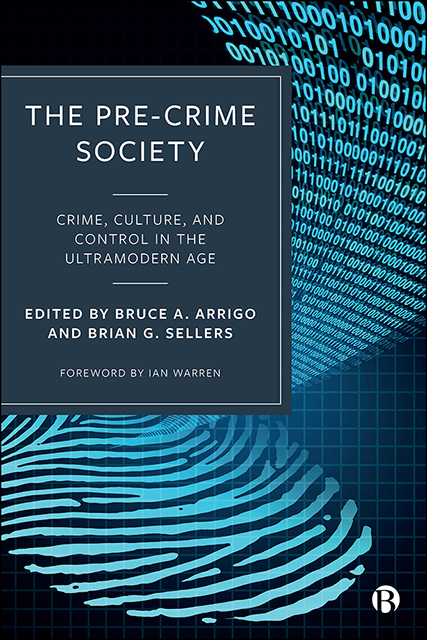Book contents
- Frontmatter
- Dedication
- Contents
- Notes on Contributors
- Foreword
- Introduction: The Ultramodern Age of Criminology, Control Societies and ‘Dividual’ Justice Policy
- Part I Theories, Theorists and Theoretical Perspectives
- Part II Institutions, Organizations and the Surveillance Industrial Complex
- Part III Dataveillance, Governance and Policing Control Societies
- Part IV Systems of Surveillance, Discipline and the New Penology
- Part V Globalizing Surveillance, Human Rights and (In)Security
- Afterword: ‘Pre-Crime’ Technologies and the Myth of Race Neutrality
- Index
10 - Theorizing Surveillance in the Pre-Crime Society
Published online by Cambridge University Press: 14 April 2023
- Frontmatter
- Dedication
- Contents
- Notes on Contributors
- Foreword
- Introduction: The Ultramodern Age of Criminology, Control Societies and ‘Dividual’ Justice Policy
- Part I Theories, Theorists and Theoretical Perspectives
- Part II Institutions, Organizations and the Surveillance Industrial Complex
- Part III Dataveillance, Governance and Policing Control Societies
- Part IV Systems of Surveillance, Discipline and the New Penology
- Part V Globalizing Surveillance, Human Rights and (In)Security
- Afterword: ‘Pre-Crime’ Technologies and the Myth of Race Neutrality
- Index
Summary
Introduction
This chapter interweaves ‘surveillance theory’, ‘policing studies’ and ‘field theory’ (Bourdieu, 1984) to examine the politics of ‘pre-crime’ in the UK ‘field of policing’. The theoretical literature on policing and new surveillance technologies often describes these developments in terms of epochal shifts or societal transformations, such as the emergence of the ‘control society’ (Deleuze, 1992) or the ‘pre-crime society’ (Zedner, 2007). However, these abstract narratives of change often fail to explore how wider global trends or social forces, such as neoliberalism or bio-power, are refracted through the crime control field in different national jurisdictions. In contrast, the questions posed in this chapter are more modest. They include questions such as what is pre-crime? What is surveillance? What is the connection between surveillance and pre-crime? Why has there been an apparent shift in crime control policy from the penal-welfare strategy towards pre-crime and surveillance? To what extent are pre-crime mentalities and new surveillance technologies being incorporated into police practice? These questions in turn lead to further questions, such as who are the ‘police’, what is ‘policing’ and which ‘policing’ organizations are adopting new surveillance technologies that facilitate the ‘preemptive turn’? To address these questions, we situate the emergence of new surveillance technologies within ‘fields of struggle’, defined ‘as a structured space of positions in which the positions and their interrelations are determined by the distribution of different kinds of resources or “capital” ‘ (Thompson, 1991, p. 14). For Bourdieu, ‘fields of struggle’ are relatively autonomous social spaces ‘that cannot be collapsed under an overall societal logic’ (Bourdieu & Wacquant, 1992, p. 17) such as ‘modernity’ or ‘post-modernity’, or, we might add, the ‘pre-crime’ society. We use this approach to examine the use of new surveillance technologies by a diverse network of agencies that make up the ‘field of policing’. At the same time, we try to avoid giving the impression of an all-encompassing ‘police network’ that underplays the existence of hierarchies, lines of confrontation or ‘the distinction between central and peripheral actors’ (Bonelli & Bigo, 2005, p. 8). We begin, however, by defining the key concepts (‘surveillance’, ‘precrime’ and ‘policing’) and explaining how they are related.
Background and context: surveillance, pre-crime and policing
Let us begin with surveillance defined as the ‘collection and analysis of information about populations in order to govern their activities’ (Haggerty & Ericson, 2006, p. 3).
- Type
- Chapter
- Information
- The Pre-Crime SocietyCrime, Culture and Control in the Ultramodern Age, pp. 227 - 248Publisher: Bristol University PressPrint publication year: 2021



